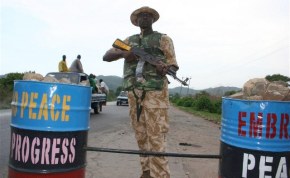
Nigerian soldier
The attacks on BH camps in northern parts of Borno close to the borders with Chad, Niger and Cameroon followed the 14 May declaration of a state of emergency by Nigerian President Goodluck Jonathan in the northeastern states of Borno, Yobe and Adamawa.
Musa Karimbe fled his village of Bulabute near Marte, BH's major stronghold in the area, on 17 May to Kusiri, 100km inside Cameroon where he is staying with a friend. "We are afraid of a repeat of Baga attacks on our homes," Karimbe said, referring to fighting on 16 and 17 April between troops from the Chad-Niger-Nigeria Joint Multi-National Task Force and BH members in which 187 residents from Baga town on the shores of Lake Chad were killed, and 2,128 homes burnt, according to Human Rights Watch.
People from villages around Abadam District, including Malamfatori, fled to Bosso in Niger's Diffa Region, while others have taken refuge in the Cameroonian towns of Fotokol, Amchide, Darak and Kusiri, according to interviews with displaced Nigerians. Officials say 2,000 people have fled across borders, though several of the displaced told IRIN they thought the number was higher.
The number of casualties from the fighting is not yet clear, though Nigeria defence spokesman Brig-Gen Chris Olukolade said on 17 May that there had been BH casualties, and that 100 BH members had been arrested.
An official with the Nigerian Emergency Management Agency (NEMA) in the capital, Abuja, said they had not yet been able to establish contact with their teams to find out the details of the humanitarian situation, because telephone networks in Borno and Yobe states have been shut down since 16 May. "The areas where military operations are ongoing, are not accessible," he told IRIN.
Residents of Gamboru Ngala in Borno State said military forces screened them thoroughly before allowing them to cross the border; others passed through the network of unofficial trade routes that criss-cross the region.
The military has placed a "food blockade" on northern Borno, refusing to allow trucks laden with household commodities from leaving Maiduguri (the state capital) to the northern part of the state, in case they end up in BH hands. As a result, prices have shot up, said Bukar Zanna, head of the Traders' Association in Gamboru Ngala.
Since January 2013 BH has taken control of Marte, Mobbar, Gubio, Guzamala, Abadam, Kukawa, Kala-Balge and Gamboru Ngala local government areas in northern Borno, chasing out local government officials, taking over control of government buildings and imposing Sharia law.
No comments:
Post a Comment